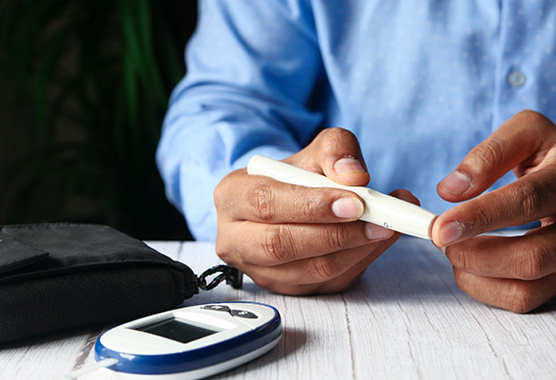Insulin Resistance
We support you with treatment plans designed to reduce insulin resistance and lower your risk of developing diabetes.
Medically reviewed by Berit Bagley, MSN on Nov. 08, 2023.

Specialized Care and Treatment for Insulin Resistance
Our diabetes and endocrinology care at UC Davis Health ranks among the best in the nation. We offer specialized support and treatment for insulin resistance.
What Is Insulin Resistance?
Insulin is a hormone made in your pancreas. It helps your body convert glucose (sugar) in your blood into energy. When you eat food, your blood glucose (blood sugar) levels rise. Insulin helps prevent your blood sugar from getting too high.
When you have insulin resistance, your body grows less efficient at converting glucose to energy. Your pancreas needs to produce more and more insulin to maintain healthy blood sugar levels.
Insulin resistance can lead to prediabetes or diabetes, in which your body can't produce enough insulin to keep your blood sugar stable.
Insulin Resistance Symptoms
Insulin resistance rarely causes symptoms. If it leads to prediabetes (higher than normal blood sugar levels) or diabetes, you may begin to experience symptoms. However, insulin resistance itself is a symptomless condition for most people.
Causes of Insulin Resistance
Several medical conditions may lead to the development of insulin resistance. These include:
High Blood Pressure
High blood pressure (hypertension) can interfere with your body’s ability to convert blood glucose.
High Triglycerides
High triglycerides (fat in your blood) make it harder for your body to convert food into energy. This contributes to insulin resistance.
History of Gestational Diabetes
Gestational diabetes during pregnancy can cause continued insulin resistance after you give birth.
Obesity
Excess weight (especially around the waist) is a leading cause of insulin resistance.
Polycystic Ovary Syndrome (PCOS)
PCOS causes a hormonal imbalance in your body and can lead to insulin resistance and diabetes.
Risk Factors for Insulin Resistance
Certain genetic and lifestyle factors can increase your risk. These include:
Age
People over the age of 45 are more likely to develop insulin resistance.
Family History
A family history of diabetes increases the likelihood that you will have insulin resistance.
Sedentary Lifestyle
Not exercising enough increases your risk.
Diagnosis and Testing for Insulin Resistance
We don’t test specifically for insulin resistance. Your provider may diagnose you with the condition if blood tests show you have:
- High blood sugar
- High LDL cholesterol levels (“bad” cholesterol)
- High triglycerides
- Low HDL cholesterol levels (“good” cholesterol)
If you receive a diagnosis of insulin resistance, it doesn’t mean you will develop diabetes. Our experts will recommend a treatment plan to reduce or even reverse your body’s resistance.
Insulin Resistance Treatments
Our treatment plans focus on healthy diet and lifestyle habits that can reverse insulin resistance. We put you in control of your health. Our diabetes and endocrinology specialists may recommend:
Medication
We may prescribe diabetes medications that lower blood glucose levels.
Meal Planning
Our experts understand the effects of different foods on blood sugar levels. We’ll help you plan healthy meals to control your blood sugar.
Educational Resources
We offer a series of diabetes classes recognized by the American Diabetes Association. These classes educate and empower you to manage and reduce your insulin resistance.
Preventing Insulin Resistance
Making changes to your diet and lifestyle can improve your health and prevent you from developing insulin resistance. Healthy lifestyle habits include:
Eating Well
A heart-healthy diet low in refined sugar and simple carbohydrates reduces how much insulin your body needs.
Exercising
Exercise helps your body become more sensitive to insulin. This helps balance your blood sugar levels and reduces the amount of insulin your pancreas has to produce.
Losing Excess Weight
Studies show that losing weight can reduce your chance of developing insulin resistance and prediabetes if you are at a high risk.
“Insulin Resistance & Diabetes," National Institute of Diabetes and Digestive and Kidney Issues, https://www.niddk.nih.gov/health-information/diabetes/overview/what-is-diabetes/prediabetes-insulin-resistance
Who does it affect?
40%Of adults between ages 18-44 have insulin resistance
Source: National Library of Medicine: Insulin Resistance
Request an Appointment
As Sacramento's No. 1 hospital, you'll benefit from unique advantages in primary care and specialty care. This includes prevention, diagnosis and treatment options from experts in 150 specialties.
Referring Physicians
To refer a patient, submit an electronic referral form or call.
800-4-UCDAVIS
Patients
Call to make an appointment.
Consumer Resource Center
800-2-UCDAVIS

Ranked among the nation’s best hospitals
A U.S. News & World Report best hospital in cardiology, heart & vascular surgery, diabetes & endocrinology, ENT, geriatrics, neurology & neurosurgery, and pulmonology & lung surgery.

Ranked among the nation’s best children’s hospitals
U.S. News & World Report ranked UC Davis Children’s Hospital among the best in pediatric nephrology, orthopedics*, and pulmonology & lung surgery. (*Together with Shriners Children’s Northern California)

Ranked Sacramento’s #1 hospital
Ranked Sacramento’s #1 hospital by U.S. News, and high-performing in aortic valve surgery, back surgery (spinal fusion), COPD, colon cancer surgery, diabetes, gynecological cancer surgery, heart arrhythmia, heart failure, kidney failure, leukemia, lymphoma & myeloma, lung cancer surgery, pacemaker implantation, pneumonia, prostate cancer surgery, stroke, TAVR, cancer, orthopedics, gastroenterology & GI surgery, and urology.

The nation’s highest nursing honor
UC Davis Medical Center has received Magnet® recognition, the nation’s highest honor for nursing excellence.

World-class cancer care
One of ~59 U.S. cancer centers designated “comprehensive” by the National Cancer Institute.

A leader in health care equality
For the 13th consecutive year, UC Davis Medical Center has been recognized as an LGBTQ+ Healthcare Equality Leader by the educational arm of America’s largest civil rights organization.

